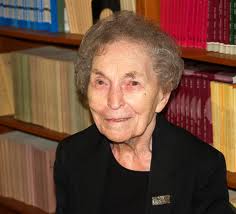(This post was written by Deeksha Supyaal Bisht, volunteer at CCS.)
Anna Schwartz, a well-known American monetary economist, known as “high priestess of Monetarism,” died at the age of 96, this Thursday.
Schwartz, along with Milton Friedman, was seen as one of the leading lights of Monetarism, a school of thought that believes that the money supply has a crucial influence on economic activity and inflation. She is best known for the book she wrote in collaboration with Milton Friedman, The Monetary History of United States 1867-1960, which became a classic of economic literature. The thesis of the book was that the Federal Reserve, by tightening the money supply and allowing commercial banks to fail, caused an otherwise normal recession to turn into the Great Depression. Earlier, economists believed that the Great Depression was a result of the loss of investor and consumer confidence following the Wall Street Crash of 1929.
According to Ben Bernanke, the current chairman of the Federal Reserve, her book gave “the leading and most persuasive explanation of the worst economic disaster in American history”.
Anna, however, criticized her diehard follower for mis-interpreting the idea of monetarism and her analysis of money and banking. “Mr. Bernanke seems to know only two amounts: zero and trillions,” she said, alluding to his zero interest rate policy and plan of expanding Fed’s assets to $2 trillion in July 2009, more than double the level of early 2008. In her view, Bernanke had given the economy an overdose of liquidity which she believed was unable to make a difference. She strongly opposed his re-appointment as the Fed’s Chairman in her Op-Ed article in The New York Times.
She regretted that Milton Friedman was not able to witness the present state of the American Economy.
Schwartz was born on 11th November 1915 in New York City , graduated at the age of 18 from Barnard College, New York and did her masters in Economics from Columbia University aged 19. In 1941, she joined the National Bureau of Economic Research, where she engaged in the study of business cycles. She earned a PhD from Columbia University at the age of 48.
Schwartz also worked in the area of international transmission of inflation and business cycles, the behaviour of interest rates and their effect on deflation, on monetary standards and measuring the output of banks.
She was known as the standard bearer of Milton Friedman after he died. Friedman once said, “Anna did all of the work, and I got most of the recognition.”
Post Disclaimer
The opinions expressed in this essay are those of the authors. They do not purport to reflect the opinions or views of CCS.






